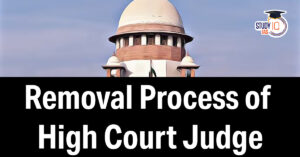Table of Contents
Reasons Behind High Number of Pending Cases
- Frequent Adjournments: Approximately half of the 90 cases listed daily in district and subordinate courts get adjourned.
- Reasons for adjournments include the need for:
- Evidence gathering.
- Legal research.
- Filing motions or awaiting external events affecting the verdict.
- Reasons for adjournments include the need for:
- Complex Judicial Processes: Multiple stages of a case—charge sheet filing, charge framing, evidence presentation, arguments, and judgment—each introduce delays due to structural inefficiencies.
- Examples of delays:
- Prolonged evidence collection by investigation officers.
- Inefficient summons processes by police and public prosecutors.
- Misleading or outdated information in case records (roznama).
- Misplacement of case files, especially in prolonged cases.
- Limited Use of Technology: Many district courts lack adequate video conferencing facilities, hindering modernization.
- Inadequate Legal Aid: Undertrials from poor socioeconomic backgrounds lack awareness of free legal aid and face issues with the quality of legal assistance.
- Examples of delays:
Challenges in Proposed Solutions
- Performance Metrics for Judges: Encouraging judges to prioritize high-disposal cases may sideline sensitive or complex cases.
- Hasty judgments can increase appeals, further burdening the judiciary.
- Engaging Retired Officials for Administrative Tasks: Retired officials may lack sensitivity and familiarity with judicial procedures, potentially creating inefficiencies and unfairness.
- Video Proceedings: Intimidation during virtual hearings as accused are surrounded by jail officers.
- Inability to assess the physical condition or well-being of the accused.
- Loss of crucial rights like meeting family and lawyers confidentially during court appearances.
Key Recommendations
- Structural Reforms in Judicial Processes: Identify and address delays at critical stages like evidence collection, summons issuance, and documentation accuracy.
- Improve case records (roznama) to ensure accurate tracking of case stages.
- Improve Legal Aid Access: Allocate more resources to strengthen free legal aid systems.
- Raise awareness about legal aid among underprivileged undertrials.
- Balanced Approach to Adjournments: Avoid rigid limits on adjournments; evaluate the justification based on case-specific needs.
- Responsible Use of Technology: Enhance video conferencing facilities while safeguarding the rights of undertrials.
- Address issues of intimidation and ensure confidentiality during proceedings.
- Focus on Fair and Speedy Trials: Ensure the pursuit of faster case disposal does not compromise fairness.
- Prioritize systemic solutions over quick fixes like performance metrics or external delegations.
- Resource Allocation: Increase investments in judicial infrastructure, technological modernization, and human resources to address systemic bottlenecks effectively.


 Utkal Divas 2025: Odisha Foundation Day ...
Utkal Divas 2025: Odisha Foundation Day ...
 Transfer and Removal Process for High Co...
Transfer and Removal Process for High Co...
 List of Military Exercises of India 2024...
List of Military Exercises of India 2024...





















